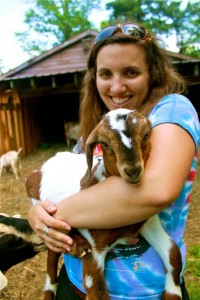It can begin as a childhood passion, a mid-life career shift, or a retirement plan gone awry. A diverse group of individuals end up with careers in food and agriculture and they’re not all in farming.
 This week’s blog post is from Garland Mason, who until recently farmed in West Tinmouth and coordinated the New Farmer Initiative and Farm to School and Institution activities at the Rutland Area Farm and Food Link (RAFFL). Garland left Vermont this month to begin a graduate program at Virginia Tech in Blacksburg, Virginia.
This week’s blog post is from Garland Mason, who until recently farmed in West Tinmouth and coordinated the New Farmer Initiative and Farm to School and Institution activities at the Rutland Area Farm and Food Link (RAFFL). Garland left Vermont this month to begin a graduate program at Virginia Tech in Blacksburg, Virginia.
For those who don’t want to wake up before the sun rises seven days a week for the rest of their lives, there are plenty of career paths in food and agriculture that abide by a saner schedule, while still getting your hands dirty.
If you’re thinking of pursuing a career in food and agriculture, either as a young person, or as a second career, here are a few ways to jump in:
Butcher
Good butchers are in high demand. There aren’t many slaughterhouses left in the state, and farmers need skilled butchers to create high quality cuts for their customers. As a butcher you might find yourself standing for long hours in a freezing-cold room, but with some effort and talent, you’ll never find yourself without work.
The Hannaford Career Center in Middlebury offers the “Skilled Butcher & Meat Cutter Academy” which would provide an excellent introduction to the field. An apprenticeship with a veteran butcher, following your schooling, would have you well on your way to landing a great job. More information about Adult Education at the Hannaford Center.
Chef
With the popularity of farm-to-table restaurants on the rise, and the heightened demand for caterers using local foods in creative ways, a career as a chef could have you linked in to the world of farming. Although you won’t find yourself on a farm working as a chef, you might find yourself in tune with the seasons, thinking of creative menus featuring the vegetable of the week, or special cuts of fresh meat from your favorite farmer.
In Vermont, the New England Culinary Institute (NECI) fosters the development of talented chefs that know how to make the most out of the culinary bounty Vermont has to offer.
Veterinarian & Vet Techs
Large animal veterinarians are in short supply in rural areas. As a large animal vet you might find yourself up to your shoulder in the back end of a cow, performing surgery on a sick horse, inspecting herds for disease or infection and assisting with the delivery of a newborn animal. The life of a large animal vet is far from glamorous, but it is rewarding and highly valued.
Vet techs provide key support to practicing veterinarians. Their work includes animal care, lab work, pharmacy, radiology, and client education. Vermont Technical College offers a two-year vet tech program. Graduates may go on to bachelor’s degree programs in Animal Science, Veterinary Technology, and other related fields.
To become a veterinarian, start with a degree in biology or animal science, making sure to fulfill the course requirements for your chosen veterinary school along the way. A bachelor’s degree is then followed of 4 years of veterinary school, plus a residency depending on your chosen concentration.
Scientist
Scientists are indispensable in the world of food and agriculture. Soil scientists, food scientists, experts in insects, plant diseases, animal nutrition, plant or animal genetics, and water quality are all called on regularly, and are valued for their knowledge and ideas. These scientists work for government agencies, universities, non-profits or private companies.
Scientists are usually required to have a master’s degree or higher in their field of expertise. If you’re thinking of becoming a scientist in a particular field, a good place to start might be shadowing an expert and thinking about whether the job would be a good fit for you—and doing well in science and math classes all the while!
Teacher
Teachers are important in nearly every field, and food and agriculture is no exception. Educators in the realm of food and agriculture could find themselves teaching kindergarteners about eating vegetables, high school students about farming, or conducting adult education classes on cooking.
As a teacher you might find yourself working in a classroom, in a kitchen or cafeteria, or outside in a garden or on a farm. There are many different avenues that could lead to becoming a teacher, just focus on developing your skills at conveying your thoughts and ideas in a clear way, and understanding how others learn.
Non-Profit
A career in food and agriculture may lead you to job at a non-profit organization, as it has for me. Non-profits work in many realms, affecting political and government policies on topics as far-ranging as food safety, animal welfare, water quality and labor. There are others, like RAFFL, that work on community development projects promoting local foods and farms. If you care about helping others, and working on a grass-roots level, a job at a non-profit may be for you.
Of course, there are many other pathways that can lead you to a career in food and agriculture. Regardless of how you arrive, you can be rest assured that your chosen career will be fulfilling and meaningful. Check out the Vermont Farm to Plate Atlas to see all the different kinds of organizations and businesses involved with food and agriculture.
And for more information on how to get started with a career in food and agriculture, whether you’re still in high school, thinking of a mid-career shift, or a meaningful retirement, check in with the folks at Good Food Jobs (www.goodfoodjobs.com) or the Greenhorns (www.thegreenhorns.net).
We wish Garland all the best with her studies!








